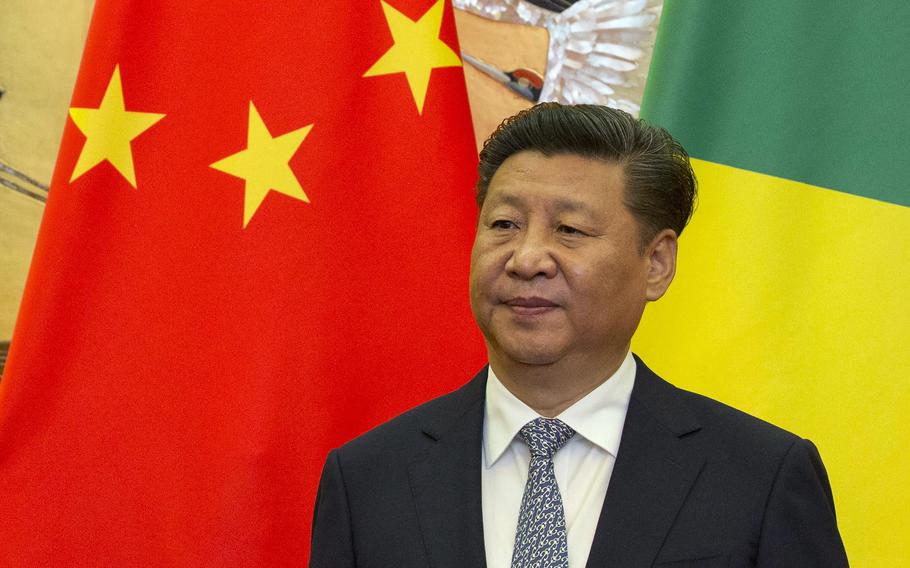
FILE - Chinese President Xi Jinping stands in front of national flags of China and Republic of Congo during a meeting with visting Congolese dignitaries at the Great Hall of the People in Beijing, China, Tuesday, July 5, 2016. China on Wednesday, Dec. 1, 2021, urged its citizens to leave three provinces in eastern Congo as violence intensifies in the mineral-rich region. (Ng Han Guan/AP)
WASHINGTON - The House of Representatives voted Wednesday night to ban most imports from the Xinjiang region in China over concerns that goods were made there through the use of forced labor, as Western nations continue to confront Beijing’s crackdown on ethnic minorities in the area.
By an overwhelming 428-1 vote, the House moved to ban all imports from the region in northwest China unless customs officers in the United States are able to determine that the products were not made with forced labor. The bill also requires many listed companies in the United States who engage in Xinjiang-related activities to make regular disclosures. There are already U.S. restrictions on the import of several goods made there.
Since 2017, Beijing has waged a campaign to forcibly assimilate the Uyghur community, carrying out widespread surveillance and repression, as well as detaining many members of the mostly Muslim ethnic minority in centers and camps. The practices have garnered accusations of crimes against humanity and both the Biden and Trump administrations, as well as several European legislatures, have declared China’s treatment of Uyghur Muslims a genocide.
Rep. Jim McGovern, D-Mass., who sponsored the bill in the House, said in a Wednesday statement that the legislation had a “simple purpose: to stop the government of China from exploiting the Uyghur people.”
“In two months, the Chinese government will host the Winter Olympics in the middle of a genocide. We must take a clear moral position to stand with those who are suffering because of forced labor,” he added. The White House announced Monday that the United States would not send any officials to the Olympics because of Beijing’s human rights abuses.
The sole vote against the measure was from Rep. Thomas Massie (R-Ky.), who has said in the past that he did not want the U.S. government to “meddle” in the internal affairs of other countries.
The bill’s passage drew a fierce response from Beijing, which has repeatedly denied allegations of forced labor in Xinjiang.
Ministry of Commerce spokesperson Gao Feng said Thursday the legislation was an example of the United States “masquerading unilateralism, protectionism and bullying as concerns for human rights,” adding that China would “staunchly defend” its interests.
The most recent tweet from the Chinese Embassy in the United States, from January, purportedly quotes a Uyghur person saying: “We want good life, so we work and make money with our hard work, why would we need to be forced to do so?”
The bill now heads to the Senate. Sen. Marco Rubio (R-Fla.), who has pushed for the legislation in that chamber, has said it should be presumed that any product made in the region was “made by slaves.” The legislation includes a provision requiring the president to impose sanctions on individuals and foreign entities who are found to be “knowingly facilitating” forced labor in Xinjiang.
Xinjiang produces 85 percent of China’s cotton, and factories there produce nearly half the world’s supply of a key ingredient for solar panels. With the region playing such a major role in global supply chains, business groups and large companies - including Apple - have lobbied against restrictions on imports from there.
The solar value chain “is almost completely contaminated by forced labor,” according to an industry analyst, Johannes Bernreuter.
China has worked to contain evidence of the crackdown in Xinjiang, wiping information from websites and expelling journalists who have documented the government’s practices there, which reportedly included forced assimilation, torture and forced sterilizations and abortions.
Beijing has in recent weeks stumbled in its attempt to quell concerns over the disappearance of tennis player Peng Shuai, who accused a senior government official of sexual assault.